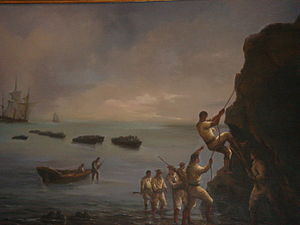Capture of Valdivia
| Capture of Valdivia | |||||||
|---|---|---|---|---|---|---|---|
| Part of the Chilean War of Independence | |||||||
 A painting of the fall of Valdivia in the Chilean naval and maritime museum |
|||||||
|
|||||||
| Belligerents | |||||||
|
|
|
||||||
| Commanders and leaders | |||||||
|
Lord Cochrane Jorge Beauchef |
|
||||||
| Strength | |||||||
| 350 | 1,606 118 cannons |
||||||
| Casualties and losses | |||||||
| 7 killed 19 wounded |
~100 killed 106 prisoners |
||||||
The Capture of Valdivia was a battle in the Chilean War of Independence between Spanish forces commanded by Colonel Manuel Montoya and the Chilean forces under the command of Lord Cochrane, held on 3 and 4 February 1820.
After failing to capture the Spanish fortress of Real Felipe in El Callao, Cochrane decided to assault the city of Valdivia, the most fortified place in South America at the time. Valdivia was considered a threat to Chilean independence as it was a stronghold and supply base for Spanish troops. Valdivia provided a safe landing site for sending reinforcements to the loyalist guerrilla fighting the Guerra a muerte in the area of La Frontera.
Valdivia was isolated from the rest of Chile by native Mapuche territory, and the only entrance to Valdivia was Corral Bay, at the mouth of Valdivia River. The bay was protected by several forts built to prevent pirate raids or any attack from a foreign nation.
The defenses at Valdivia consisted of a number of forts and defensive positions. On the South side of the harbour were four forts - Fort Ingles, Fort San Carlos, Fort Amargos and Fort Chorocomayo. Further inland was Corral Castle to defend against a landward assault. On the Northern side was the stone walled Fort Niebla. Mancera Island in the centre of the harbour was also heavily garrisoned.
Facing these powerful fortifications, Lord Cochrane decided to attack the forts from the land in an amphibious nighttime operation. The troops landed south of the bay on the Aguada del Ingles (the English Beach). Taken by surprise, the Fort Ingles was captured quickly, with the fugitives running towards the next fort, Fort San Carlos. The attackers got in among the fleeing Spanish troops and in the confusion were able to capture San Carlos and subsequently the other two forts on the south side of the harbour, with only Fort Chorocomayo showing brief resistance before capitulating.
...
Wikipedia
